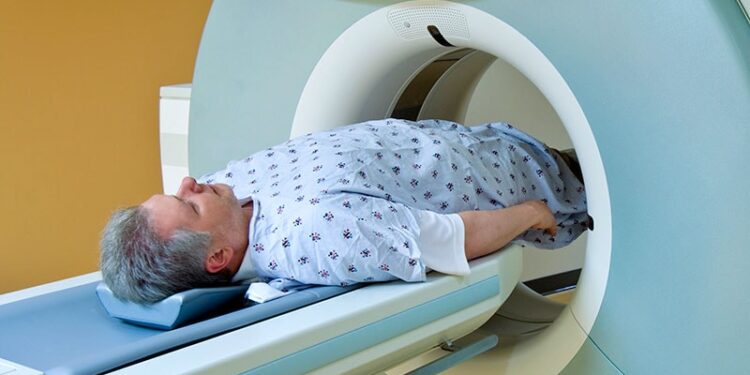TOPLINE:
A large screening trial showed that using prostate-specific antigen density (PSAD) before MRI prevented overdiagnosis and lowered resource use while preserving the detection of clinically significant prostate cancer (PCa). However, PSAD cutoffs > 0.075 ng/mL2 lowered MRI use but risked missing significant cases of cancer.
METHODOLOGY:
- This randomised, prospective screening trial for PCa (STHLM3MRI) included 12,750 participants aged 50-74 years residing in Stockholm, Sweden, between 2018 and 2020.
- Participants were randomly assigned to receive either a systematic prostate biopsy (standard group; n = 5134) or a specific PCa screening procedure (experimental group; n = 7609).
- In the experimental group, men with PSA levels ≥ 3 ng/mL underwent a biparametric MRI, followed by combined targeted and systematic biopsies in cases with lesions scoring ≥ 3 on the Prostate Imaging Reporting and Data System.
- The reference strategy for MRI (PSA levels ≥ 3 ng/mL) was compared in terms of outcomes with four alternative strategies using PSA levels ≥ 3 ng/mL plus PSAD cutoffs of 0.075, 0.10, 0.125, or 0.15 ng/mL2.
- The primary outcome was the detection of clinically significant PCa (Gleason score ≥ 3 + 4); secondary outcomes included the detection of indolent PCa (Gleason score 6) and cancers with a Gleason score ≥ 4 + 3, along with the number of MRI scans and biopsies performed.
TAKEAWAY:
- A total of 2.4% of men in the experimental arm with elevated PSA levels had Gleason ≥ 3 + 4 PCa.
- The implementation of a low PSAD cutoff (0.075 ng/mL2) led to a reduction in the detection of indolent cancer by 17% (relative positive fraction [RPF], 0.83; 95% CI, 0.72-0.96), MRI scans by 28% (RPF, 0.72; 95% CI, 0.69-0.75), and biopsy procedures by 13% (RPF, 0.87; 95% CI, 0.83-0.91).
- Only 5% of Gleason ≥ 3 + 4 cancer cases missed at the 0.075 ng/mL2 cutoff (RPF, 0.95; 95% CI, 0.92-0.98), with no significant difference in the detection of Gleason ≥ 4 + 3 cancer cases being observed.
- Using an increased PSAD threshold of 0.10 ng/mL2 missed 18% of Gleason ≥ 3 + 4 and 13% of Gleason ≥ 4 + 3 PCa cases.
IN PRACTICE:
“[The study] findings highlight the potential of PSAD-based selection criteria to optimize PCa screening by focusing on higher-risk individuals, minimizing unnecessary interventions,” the authors wrote. “However, determining the most appropriate PSAD cutoff is crucial,” they added.
SOURCE:
This study was led by Lars Björnebo, Karolinska Institutet, Stockholm, Sweden. It was published online on July 29, 2025, in European Urology Focus.
LIMITATIONS:
This study was conducted at a single academic centre, which may have affected the generalisability of the findings. The study assumed equivalence between ultrasound and MRI-derived prostate volumes, which may have introduced bias. Transrectal ultrasound (TRUS) may have underestimated the volume of very large prostates, potentially yielding falsely elevated PSAD values. Additionally, adherence to the TRUS procedure may have varied in practice.
DISCLOSURES:
This study was funded by the Swedish Cancer Society (Cancerfonden), the Swedish Research Council (Vetenskapsrådet), the Swedish Research Council for Health Working Life and Welfare, Karolinska Institutet, Prostatacancerförbundet, Region Stockholm, the Sigfrid Linnér and Johanna Hagstrand Foundation, and the Åke Wibergs Foundation. Karolinska Institutet collaborated with A3P Diagnostics in developing the technology for the Stockholm3 test. Some authors reported owning A3P stocks, being employed by A3P Diagnostics, or holding pending patents related to PCa diagnosis. Details are provided in the original article.
This article was created using several editorial tools, including AI, as part of the process. Human editors reviewed this content before publication.
Source link : https://www.medscape.com/viewarticle/psa-density-optimises-mri-use-prostate-cancer-screening-2025a1000kvg?src=rss
Author :
Publish date : 2025-08-08 12:00:00
Copyright for syndicated content belongs to the linked Source.




